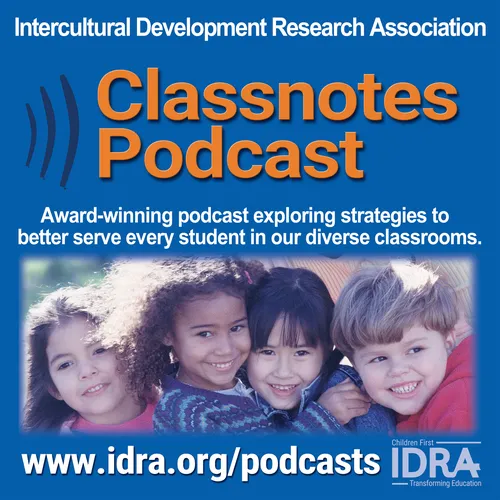Affective Lessons are Effective Lessons (Science for English Learners) – Podcast Episode 119
- Author
- http://www.idra.org/Podcasts/
- Published
- Mon 25 Feb 2013
- Episode Link
- https://www.idra.org/resource-center/affective-lessons-are-effective-lessons/
 Classnotes Podcast (February 25, 2013) As students get older and move into middle school and high school, some lose their positive attitude for certain subjects like science. Brain research indicates that emotion shapes cognition which naturally affects learners’ cognitive engagement. But teachers can lower students’ affective filter by valuing students’ perspectives and knowledge of science as they plan and deliver their lessons. Veronica Betancourt, M.A., continues our series of conversations on seven research-based strategies IDRA has developed for delivering instruction differently for secondary students. In this episode, she focuses on Strategy #2: Design asset-based science lessons for culturally and linguistically diverse classrooms. She describes why value-driven lessons are particularly important for English language learners and how to design asset-based science lessons. Veronica is interviewed by Bradley Scott, Ph.D., director of the IDRA South Central Collaborative for Equity.
Classnotes Podcast (February 25, 2013) As students get older and move into middle school and high school, some lose their positive attitude for certain subjects like science. Brain research indicates that emotion shapes cognition which naturally affects learners’ cognitive engagement. But teachers can lower students’ affective filter by valuing students’ perspectives and knowledge of science as they plan and deliver their lessons. Veronica Betancourt, M.A., continues our series of conversations on seven research-based strategies IDRA has developed for delivering instruction differently for secondary students. In this episode, she focuses on Strategy #2: Design asset-based science lessons for culturally and linguistically diverse classrooms. She describes why value-driven lessons are particularly important for English language learners and how to design asset-based science lessons. Veronica is interviewed by Bradley Scott, Ph.D., director of the IDRA South Central Collaborative for Equity.
Show length: 12:42
Send comments to [email protected]
Sign up for Classnotes e-mail alerts.
Resources
Asset-Based Lessons for Linguistically Diverse Classrooms
Veronica Betancourt, M.A., IDRA Newsletter
http://www.idra.org/resource-center/asset-based-lessons-for-linguistically-diverse-classrooms/
Science Instructional Strategies for English Learners ~ A Guide for Elementary and Secondary Grades
by Abelardo Villarreal, Ph.D., Veronica Betancourt, M.A., and Kristin Grayson, M.Ed., IDRA
http://www.idra.org/publications/science-instructional-strategies-english-learners-guide-elementary-secondary-grades-2/
Visual Interpretation in Science – Strategies for English Language Learners
Paula Martin Johnson, M.A., and Veronica Betancourt, M.A., IDRA Newsletter
http://www.idra.org/resource-center/visual-interpretation-in-science/
IDRA South Central Collaborative for Equity
http://www.idra.org/South_Central_Collaborative_for_Equity/
Science Smart!
IDRA’s professional development that provides teachers with scientifically-based strategies to teach initiative scientific concepts, critical-thinking skills, problem-solving abilities and processes.
http://www.idra.org/Services/Science_Smart!_Secondary_Training/
Elementary and Secondary Students’ Perceptions Toward Science: Correlations with Gender, Ethnicity, Ability, Grade, and Science Achievement,
M. Faye Neathery, Electronic Journal of Science Education
http://wolfweb.unr.edu/homepage/jcannon/ejse/ejsev2n1.html
Your feedback
We welcome your comments and questions to the podcast. Send an e-mail to [email protected].
Listen to every episode!
To ensure you don’t miss a single episode of IDRA Classnotes, subscribe to the podcast in iTunes, (download iTunes free if you don’t have it) or sign up to receive an e-mail alert as soon as a new show is published.
The post Affective Lessons are Effective Lessons (Science for English Learners) – Podcast Episode 119 appeared first on IDRA.
